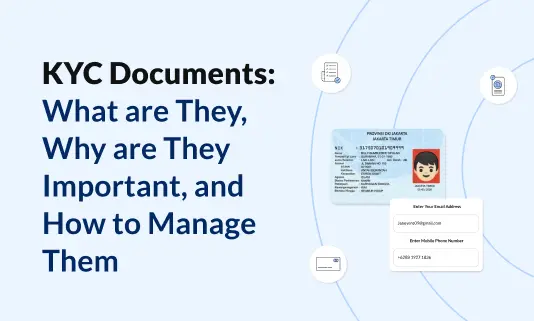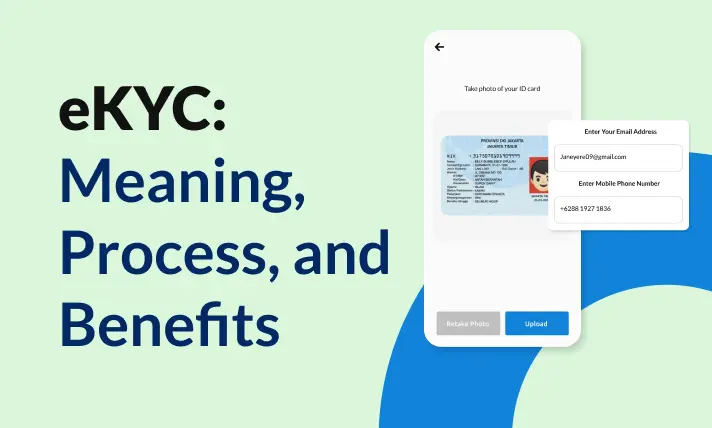Know Your Customer or KYC processes are at the core of fraud mitigation initiatives in the finance industry today. This practice allows banking institutions to verify their customers’ identities before doing business with them, helping them mitigate fraud and other finance-related crimes.
This article will explain the basics of KYC – what KYC means, how it works, its components, and its impact on the banking industry.
What is KYC?
First, what does KYC mean?
KYC stands for “Know Your Customer.” KYC is the process of identifying and verifying a prospective client’s identity. This is where an institution learns the client's name, address, contact details, employment details.
Apart from its role in the fabric of security, KYC checks are mandatory for financial institutions. Anti-Money Laundering and Know Your Customer regulations across the globe require finance institutions to identify their customers and their behaviors to help deter and detect various illegal activities.
For most finance institutions, KYC checks are part of the client onboarding process for clients who want to open a bank account, invest, buy insurance, or apply for a loan or credit card. Traditionally, KYC processes are done in person – with the client personally filling out forms and submitting documents to the organization; but with the emergence of APIs for digital banking, all these can be accomplished online.
What are the Steps in the KYC Process?
The KYC process involves three key components that work together to verify customer identities, assess risks, and monitor transactions, ensuring the integrity and security of financial transactions. Here are the three components of KYC:
-
Customer Identification Program
The KYC process starts with the client onboarding process where the banking institution verifies the person’s identity – that they are who they claim to be. The CIP step involves collecting personal information and KYC documents, verifying them, and confirming the customer’s identity.
-
Customer Due Diligence Program
This component requires institutions to collect additional credentials and evaluate the client’s profile further to understand their individual risk factors. This involves confirming their identity, location, and occupation or business activities.
Customer Due Diligence or CDD helps banks determine how much they can trust a client. Clients are classified under three categories representing different levels of measures required based on their risk profile:- Standard Customer Due Diligence – for clients presenting a normal or low level of risk; organizations collect and verify only the basic level of information.
- Enhanced Customer Due Diligence – higher risk customers or politically exposed persons (PEPs) may be subjected to thorough reviews of their activities and profile.
- Ongoing Customer Due Diligence – if an increased risk of illicit activity is detected, organizations may start to closely and continuously monitor activities to detect any changes in the pattern.
-
Continuous Monitoring
KYC verification is an ongoing process, so organizations must continue to monitor customers’ financial transactions and accounts based on their risk profile.
Continuous monitoring involves periodically reviewing if account records are up to date, if the transactions are consistent with stated purpose and risk profile, as well as if there are unusual spikes in activities, cross-border activities, or client is mentioned adversely in the media.
Who Needs KYC?
Most, if not all, countries have enforced Anti-Money Laundering and Know Your Customer regulations that apply to financial institutions and other industries with high risk of similar crimes.
Most industries are at risk for fraud and other finance-related crimes, but those that deal with finances and high-value products or services have higher risk. These are the industries or companies that could benefit from KYC:
- Banks and financial institutions
- Lending institutions
- Insurance companies
- Payment processing companies
- Gambling and betting companies
- Virtual assets service providers (e.g., cryptocurrency)
- High value retail businesses (e.g. art dealers)
What is the Importance of KYC?
Before we discuss the importance of KYC in fraud management, let’s briefly discuss fraud and fraud management.
Fraud is a pervasive threat in the business world, causing significant financial losses and damaging the reputation of institutions. Fraud encompasses a wide range of illegal activities, including identity theft, money laundering, and financial fraud.
Fraud management is essential to protect both business entities and individuals from these threats. As financial transactions become increasingly digital and global, the complexity and scale of fraudulent activities have also evolved, thus demanding effective fraud management strategies that can detect, prevent, and respond to fraud promptly.
Know Your Customer processes is at the center of this fight against fraud. Its primary roles and benefits in fraud management include:
-

Identity Verification
Collecting and validating a client’s identity is a crucial step in preventing identity theft and other illegal activities. KYC verification allows institutions to establish a prospective client’s identity, needs, and behavior, which becomes the foundation for identifying unusual activities.
-

Risk Assessment
KYC guarantees that financial institutions have ample information to accurately assess the risk profile of each customer. By understanding the customer's financial behavior and background, institutions can categorize them into different risk levels, enabling targeted monitoring and resource allocation for high-risk individuals.
-

Continuous Monitoring
The KYC process is triggered at the start of a business relationship, and it extends as Customer Due Diligence throughout the relationship. The CDD process monitors customer transactions and behavior, allowing organizations to detect unusual activities early and act immediately.
-

Regulatory Compliance
By implementing KYC practices, financial institutions ensure compliance with Anti-Money Laundering and Counter-Terrorism Financing regulations. Compliance with these regulations protects institutions from hefty legal fines and maintains their reputation.
-

Enhanced Security
By validating customers and continuously monitoring behavior, KYC processes enhance the overall security of financial transactions. This protects both institutions and individuals from money laundering, terrorist financing, identity theft, and other crimes.
-

Customer Trust
Effective KYC processes are proof of a finance institution’s commitment to security and fraud prevention. Even something as simple as a merchant link can give clients a sense of security that their banking details are protected. This trust is essential for maintaining one’s reputation and building long-term customer relationships.
Tech-Based Approaches to KYC Verification
The integration of technology in banking processes has resulted in eKYC, which is simply a digitized version of the KYC process. Instead of going to a bank, customers can fill out forms and submit their documents online.
Additionally, APIs have allowed banking institutions to collect biometric information from clients through video KYC, facial recognition, and fingerprint checks.
eKYC also employs technology to help employees verify client identities and assess their risk profiles. These APIs for lending and banking offer a more efficient way to analyze documents and provide a more accurate assessment of risk profiles. By eliminating manual checks and minimizing the risk of human errors, APIs effectively cut down how long KYC verifications take from 2 weeks to just 24 hours.
Biometric technologies are also applied to CDD processes. GoPay Data analyzes financial transaction data to extract insight on clients’ spending habits and behaviors that can be used for customer due diligence as well as personalizing services.
Overall, the use of APIs for Know Your Customer checks can help improve the efficacy, speed, and convenience of onboarding procedures. Customers can complete the onboarding process on their end in a matter of minutes while financial institutions can conduct thorough KYC checks more efficiently.
Know Your Customer Better with Brankas
Know Your Customer processes are a key piece of the puzzle in mitigating risks in the world of finance. What is KYC verification’s benefits.
It is clear what is KYC verification’s role in mitigating fraud risk in the world of finance. KYC checks allow financial institutions to deter and prevent various fraudulent activities. These efforts can be further enhanced with support from financial data API that can streamline KYC processes and scale with your growing demands.
Partner with Brankas to protect yourself and your clients from fraud.








